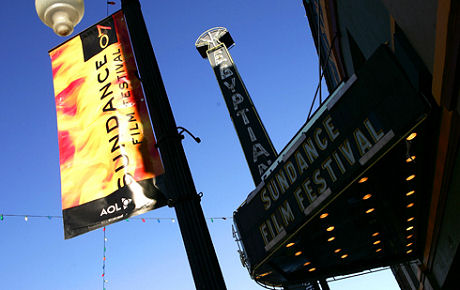The impetus for the wonderful bile in John Cook‘s Sundance-dissing piece in Radar — and a very well-written thing it is — is that Cook (a) didn’t know enough well-connected publicists, and (b) he wound up going to the wrong parties. It’s also apparent (to me anyway) that he didn’t fall in love or at least get laid. I fell in love up there (with Once, I mean), and it made all the difference in the world.

“The Sundance Film Festival is about independent cinema in much the same way the quadrennial Republican and Democratic national conventions are about democracy,” Cook observes. “Which is to say, the Sundance Film Festival is not about independent cinema. It is about status, and money, and self-regard; it’s an annual industry junket and trade show.
“The 400 or so major screenings, mind you, are not for the benefit of audiences but of fat-pocketed distributors — many of them divisions of the Hollywood studios that Sundance disingenuously poses in opposition to — eagerly searching out the next Sex, Lies and Videotape or Little Miss Sunshine.
“The relative quality of available celebrity notwithstanding, the organizers of Sundance were on a relentless campaign this year to promote the notion that the festival is about art and cinema, and that the attendant clusterfuck of swag lounges and Hummer limos and party girls dressed up like Eskimo hookers are contrary to its principles.
“Much of what happens in Park City is beyond the control of Sundance. But the festival’s arch posturing against commercialization, with Robert Redford inveighing against the swag lounges on Main Street designed to get luxury brands onto the pages of Us Weekly, is too much to take in the face of the omnipresent logos of festival sponsors Volkswagen, Hewlett-Packard, and AOL.
“And the dismissive sniffing about ‘celebrity coverage,’ which Sundance’s chief press handler, Levi Elder, accused me of contemplating when I applied for credentials, becomes petty and egregiously hypocritical when one considers the fact that the fest is programmed deliberately with films featuring stars — Winona Ryder, Heather Graham, Mandy Moore, John Cusack — who are trotted out at screenings to stand on fake, tented-off “red carpets” to be photographed in front of backdrops festooned with those aforementioned corporate logos.
“Better passes translate, roughly, into less waiting. And for the press, the arbitrary, merciless decisions of publicists — 150 credentialed publicists were in attendance — tended to induce a state of what psychological researchers call learned helplessness.
“Waiting outside for admittance to a press conference one afternoon, among a throng of perhaps 30 other journalists, I was rescued, Schindler’s List-style, by a publicist who burst from inside the building, surveyed the crowd (or, to be precise, our badges), and selected three of us who were allowed to come inside.
“I never learned why, but decided from then on that good things would happen to me if I meekly made sure I was always in eyeshot of a publicist. And when they shined upon you, all the bitterness you previously felt about the better-credentialed prima donnas would melt away, and any sense of solidarity with your freezing, milling brothers and sisters in the cold would dissolve into condescension. See you, suckers!









